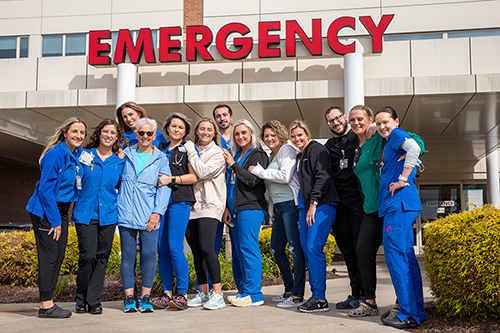New Column Addresses Men’s Health Issues
By Susan McDonald

As a clinical health psychologist with the Tallwood Men’s Health Center, Valeria Martinez-Kaigi, PhD, knows that men don’t like talking about health concerns, much less making and keeping appointments for routine screenings that could save their lives.
To bridge the gap between the providers and the reluctant patients, she started penning a monthly column called Men’s Health Matters in the fall. It’s a natural outlet for her. One of three psychologists in the Connecticut Army National Guard, with a background in journalism, Dr. Martinez-Kaigi has a unique perspective on men’s health and mental health.The column spotlights the health issues she’s seen impact men most.
“I work on a multidisciplinary medical team to provide psychological, cognitive and behavioral treatments aimed at improving people’s health,well-being and quality of life. I have expertise in biological, behavioral, and psychosocial factors of medical conditions and illness prevention,” she says. “And I’ve seen just how important it is to have uncomfortable conversations out in the open with your healthcare providers.”
In the first column, she launched into a discussion of men’s sexual health with one simple line: “If you are experiencing difficulties with sexual function, well, you are not alone.”
She includes statistics and facts, with commentary that is soothing and gentle.
“Studies show that people usually think they’re the only ones experiencing sexual issues. Clearly, that’s not the case at all,” she says in her first column.
Her expertise is on the way the mind and body work together, and how that affects a person’s life and relationships.
“Our sexual response is influenced by the biology of our bodies and brains, our mental health, our social connections, and more,” she notes.“Sexual health is complex, and multiple biological, psychological and social factors play a role.”
Dr. Martinez-Kaigi then suggests that professional help from any of the experts at Tallwood Men’s Health, including herself, can address issues men often cannot solve on their own.
“For example, if hypertension or diabetes is interfering with your sexual stimulation, you’ll need proper medical treatment. If depression, anxiety, chronic stress or trauma is part of the issue, a mental health professional can help,” she says.
Follow the column here:
https://hartfordhealthcare.org/services/tallwood-mens-health/specialties/behavioral-health
Shining a Light on Mental Wellness in ED
By Libby Marino
Healthcare is a demanding field and many colleagues carry the stress home after clocking out.
This is especially true for anyone working in an emergency department who see things the average person will never experience. Chelsea Whalen, a nurse and clinical resource leader at MidState Medical Center began to wonder how to normalize the process of being vulnerable and having difficult conversations about these experiences.
“Emergency medicine is an incredibly demanding profession, physically and mentally. We tend to overlook how intense our jobs are, simply because it’s what we love to do. In the midst of all the chaos, we also overlook ourselves and our mental health.” Whalen says.
To help, she launched the CHAMPION Committee for Emergency Department staff to prioritize their mental health and well-being.
CHAMPION committee (which stands for collaboration, healing, awareness, mental health platform inside our network) meets monthly, offering colleagues a safe place to share their thoughts and experiences, get coping advice, deal with trauma, identify triggers and connect with others who have gone through a similar situation.
Whalen says, “This committee can help people express their emotions in order to heal, process the difficult things they are seeing at work, and develop coping mechanisms so they can effectively care for their future patients.”
In addition, Whalen has organized team-building outings like goat yoga and a Yard Goats baseball game. This, she notes, helps get colleagues out of the work environment to connect on a more positive level.
“We truly are family in this emergency room and everyone is so close. It’s nice to have those experiences outside the ER,” Whalen says.

